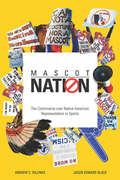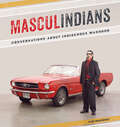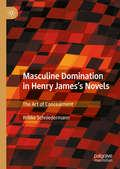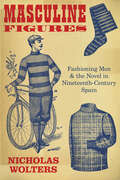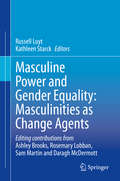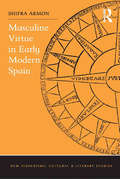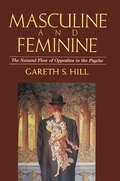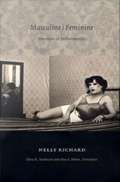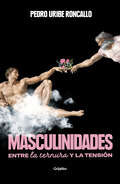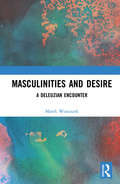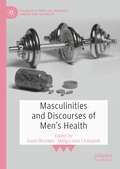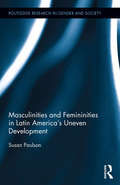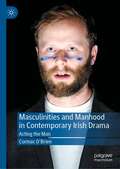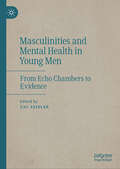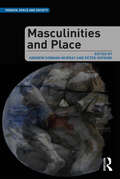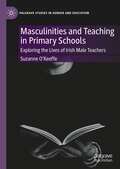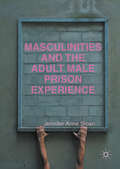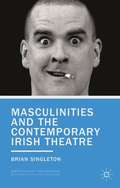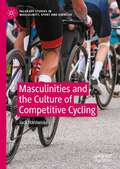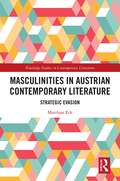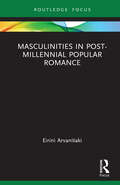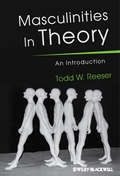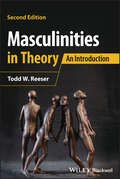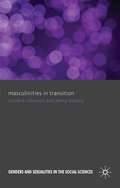- Table View
- List View
Mascot Nation: The Controversy over Native American Representations in Sports
by Jason Edward Black Andrew C. BillingsThe issue of Native American mascots in sports raises passions but also a raft of often-unasked questions. Which voices get a hearing in an argument? What meanings do we ascribe to mascots? Who do these Indians and warriors really represent? Andrew C. Billings and Jason Edward Black go beyond the media bluster to reassess the mascot controversy. Their multi-dimensional study delves into the textual, visual, and ritualistic and performative aspects of sports mascots. Their original research, meanwhile, surveys sports fans themselves on their thoughts when a specific mascot faces censure. The result is a book that merges critical-cultural analysis with qualitative data to offer an innovative approach to understanding the camps and fault lines on each side of the issue, the stakes in mascot debates, whether common ground can exist and, if so, how we might find it.
Masculindians: Conversations about Indigenous Manhood
by Richard Van Camp Tomson Highway Joseph Boyden Kim Anderson Gregory Scofield Sam Mckegney Lee Maracle Niigaanwewidam James Sinclair Basil H. Johnston Dana Claxton Daniel David Moses Louise Bernice Halfe Taiaiake Alfred Janice C. Hill Thomas Kimeksun Thrasher Brendan Hokowhitu Ty P. Tengan Warren Cariou Alison Calder Daniel Heath Justice Adrian Stimson Terrance Houle Kateri Akiwenzie-Damm Joanne Arnott Neal McleodWhat does it mean to be an Indigenous man today? Between October 2010 and May 2013, Sam McKegney conducted interviews with leading Indigenous artists, critics, activists, and elders on the subject of Indigenous manhood. In offices, kitchens, and coffee shops, and once in a car driving down the 401, McKegney and his participants tackled crucial questions about masculine self-worth and how to foster balanced and empowered gender relations. Masculindians captures twenty of these conversations in a volume that is intensely personal, yet speaks across generations, geography, and gender boundaries. As varied as their speakers, the discussions range from culture, history, and world view to gender theory, artistic representations, and activist interventions. They speak of possibility and strength, of beauty and vulnerability. They speak of sensuality, eroticism, and warriorhood, and of the corrosive influence of shame, racism, and violence. Firmly grounding Indigenous continuance in sacred landscapes, interpersonal reciprocity, and relations with other-than-human kin, these conversations honour and embolden the generative potential of healthy Indigenous masculinities.
Masculine Domination in Henry James's Novels: The Art of Concealment
by Wibke SchniedermannThis book proposes a new interdisciplinary approach to the gendered power relations in James’s novels. Reading James’s narrative form through the lens of relational sociology, specifically Pierre Bourdieu’s concept of symbolic domination, reconciles some of the most fiercely disputed positions in James studies of the past decades. The close readings focus on three novels, The Portrait of a Lady, The Wings of the Dove, and The Golden Bowl, providing a systematic relational analysis into the specifically Jamesian method of narrating the socio-psychological, embodied responses to masculine power and oppression. James persistently narrates his characters as social agents whose perception, affects, and bodily practices are products of the social structures that they in turn continue to shape and reproduce. The chapters trace a development throughout James’s career that reflects a growing sensitivity for the concealment and attendant misrecognition of gendered domination.
Masculine Figures: Fashioning Men and the Novel in Nineteenth-Century Spain
by Nicholas WoltersBased on years of archival research in Madrid and Barcelona, this interdisciplinary study offers a fresh approach to understanding how men visualized themselves and their place in a nation that struggled to modernize after nearly a century of civil war, colonial entanglement, and imperial loss. Masculine Figures is the first study to provide a comprehensive overview of competing models of masculinity in nineteenth-century Spain, and it is particularly novel in its treatment of Catalan texts and previously unstudied evidence (e.g., department store catalogs, commercial advertisements, fashion plates, and men&’s tailoring journals). Fictional masculinity performs a symbolic role in representing and negotiating the contradictions male novelists often encountered in their attempts to professionalize not only as writers, but also as businessmen, professors, lawyers, and politicians. Through specific and recurring figures like the student, the priest, the businessman, and the heir, male novelists portray and represent an increasingly middle-class world at odds with the values and virtues it inherited from an imperial Spanish past, and those it imported from more industrialized nations like England and France. The visual culture of the time and place marks the material turn in middle-class masculinity and sets the stage for discussions of race and sexuality.
Masculine Power and Gender Equality: Masculinities As Change Agents
by Russell Luyt Kathleen StarckThis book explores how political institutions can challenge dominant and normative masculinities, guiding thinking instead toward a transformation of gendered power structures and general equality. Representing a range of relevant areas, the expert chapter authors provide various methodological and theoretical approaches applied to shifting gender meanings in cultural, national, and social contexts. Authors also represent a variety of cultures, contributing to the multi-perspective debate about how best to achieve gender equality in the real world.Among the topics discussed:Reimagining masculinities, their everyday practice and practical interventions Towards a feminist theory of male rapePolitical implications of challenging men’s everyday practices through domestic violence primary prevention workMen as allies: a case study of White Ribbon AustraliaMasculine Power and Gender Equality: Masculinities as Change Agents provides valuable insight into strategies for re-imagining male-dominated power structures and promoting gender equality.
Masculine Virtue in Early Modern Spain (New Hispanisms: Cultural and Literary Studies)
by Shifra ArmonMasculine Virtue in Early Modern Spain extricates the history of masculinity in early modern Spain from the narrative of Spain’s fall from imperial power after 1640. This book culls genres as diverse as emblem books, poetry, drama, courtesy treatises and prose fiction, to restore the inception of courtiership at the Spanish Hapsburg court to the history of masculinity. Refuting the current conception that Spain’s political decline precipitated a ’crisis of masculinity’, Masculine Virtue maps changes in figurations of normative masculine conduct from 1500 to 1700. As Spain assumed the role of Europe’s first modern centralized empire, codes of masculine conduct changed to meet the demands of global rule. Viewed chronologically, Shifra Armon shows Spanish conduct literature to reveal three axes of transformation. The ideal subject (gendered male in both practice and law) became progressively more adaptable to changing circumstances, more intensely involved in currying his own public image, and more desirous of achieving renown. By bringing recent advances in gender theory to bear on normative rather than non-normative masculinities of early modern Spain, Armon is able to foreground the emergence of energizing new models of masculine virtue that continue to resonate today.
Masculine and Feminine: The Natural Flow of Opposites in the Psyche
by Gareth S. HillA Jungian analyst provides a new model for understanding the masculine and feminine principles that exist in everyone, providing insight into the events of daily life and the themes of entire lifetimes.
Masculine/Feminine: Practices of Difference(s)
by Nelly RichardNelly Richard is one of the most prominent cultural theorists writing in Latin America today. As a participant in Chile's neo-avantgarde, Richard worked to expand the possibilities for cultural debate within the constraints imposed by the Pinochet dictatorship (1973-1990), and she has continued to offer incisive commentary about the country's transition to democracy. Well known as the founder and director of the influential Santiago-based journal Revista de crítica cultural, Richard has been central to the dissemination throughout Latin America of work by key contemporary thinkers, including Néstor García Canclini, Jacques Derrida, Fredric Jameson, and Diamela Eltit. Her own writing provides rigorous considerations of Latin American identity, postmodernism, gender, neoliberalism, and strategies of political and cultural resistance. Richard helped to organize the 1987 International Conference on Latin American Women's Literature in Santiago, one of the most significant literary events to take place under the Pinochet dictatorship. Published in Chile in 1993, Masculine/Feminine develops some of the key issues brought to the fore during that landmark meeting. Richard theorizes why the feminist movement has been crucial not only to the liberation of women but also to understanding the ways in which power operated under the military regime in Chile. In one of her most widely praised essays, she explores the figure of the transvestite, artistic imagery of which exploded during the Chilean dictatorship. She examines the politics and the aesthetics of this phenomenon, particularly against the background of prostitution and shantytown poverty, and she argues that gay culture works to break down the social demarcations and rigid structures of city life. Masculine/Feminine makes available, for the first time in English, one of Latin America's most significant works of feminist theory.
Masculinidades
by Pedro UribeUn lúcido ensayo sobre las masculinidades, el rol de los hombres en la sociedad compleja de hoy y las distintas visiones que existen sobre la virilidad, el patriarcado y la deconstrucción de lo masculino. En tiempos en que el feminismo parece tomarse el debate, el sicólogo Pedro Uribe escribe sobre las luces y las sombras que están atravesando las relaciones entre los hombres y las mujeres en una sociedad compleja y turbulenta como la actual. Y se pregunta: ¿qué está pasando con los hombres?, ¿por qué algunos son violentos y otros, criados del mismo modo, no ejercen violencia de género?, ¿por qué los hombres actúan así? ¿qué están sintiendo? Desvelando el manto de misterio que cubre la masculinidad, esta es una invitación a pensar y ampliar las miradas sobre el rol de los varones en la sociedad de hoy.
Masculinities and Desire: A Deleuzian Encounter (Interdisciplinary Research in Gender)
by Marek WojtaszekMasculinities and Desire considers the question of male subjectivity in relation to Deleuze and Guattari’s theory of desire. Western tradition has thought of desire from the vantage point of masculine subjectivity; what happens when the order is reversed, and desire speaks through masculinity? Can masculinity be conceived beyond the gender binary and thus affirm its potential to transcend the patriarchal order? In answer, Masculinities and Desire calls for a radically new approach to traditional cultural criticism. Contributing a critical male perspective, the book sheds new light on the conceptual and ethical limits of established, representational (gender) criticism. Reflecting on masculinity with Deleuze, the book explores what happens to the masculine subject in his becoming-minoritarian and thus emerging as a work of desire. Wojtaszek examines the confining representations of masculinity in realms long associated with men, such as violence, virulent psychosis, metaphysical cannibalism and virtualization. Inspired by Deleuze’s appeal for immanence, Wojtaszek argues that films including American Psycho, Fight Club, Becoming John Malkovich and The Matrix are adventures of deterritorialization that imaginatively tackle various masculinities, affirming their creative resistance and reinvention of subjectivity. Desire is revealed to be a powerful catalyst for escaping the regime of patriarchal representation.
Masculinities and Discourses of Men's Health (Palgrave Studies in Language, Gender and Sexuality)
by Gavin Brookes Małgorzata ChałupnikThis book brings together a collection of case studies that explore the relationship between health and masculinity. It covers various topics related to health, such as mental health, sexual health, eating disorders and coronavirus, and offers health-based perspectives on issues such as migration and gender identity, as these relate to masculinities. In exploring these themes, this book addresses a wide range of communicative contexts, including online forums, interviews, advertising, sex education materials, migrant integration classes, and suicide notes. This book will appeal to linguists interested in health and gender (particularly masculinities), as well as scholars in fields such as psychology, media studies, cultural studies, and other humanities and social science disciplines with a focus on discourse.
Masculinities and Femininities in Latin America's Uneven Development (Routledge Research in Gender and Society #46)
by Susan PaulsonThis book forges a new approach to historical and geographical change by asking how gender arrangements and dynamics influence the evolution of institutions and environments. This new theoretical approach is applied via mixed methods and a multi-scale framework to bring together unusually diverse phenomena. Regional trends demonstrated with quantitative data include the massive incorporation of women into paid work, demographic masculinization of the countryside and feminization of cities, rapidly increasing gaps that favor women over men in education and life expectancy, and extraordinarily high levels of violence against men. Case studies in Mexico, Chile and Bolivia explore changes influenced by gender practices and expectations that involve men in different ways than women; they also highlight dissimilarities and power relations between differently positioned masculine groups. Ethnographic studies of culturally diverse arrangements, together with particular attention to subordinate versus dominant masculinities, complicate the gender binaries that circumscribe so much research and policy. Drawing attention to imbalances and conflicts generated by inappropriate models and uneven developments, the book points to opportunities for experimenting with and adapting the sociocultural institutions that govern relations among humans and between humans and their environment.
Masculinities and Manhood in Contemporary Irish Drama: Acting the Man
by Cormac O'BrienThis book charts the journey, in terms of both stasis and change, that masculinities and manhood have made in Irish drama, and by extension in the broader culture and society, from the 1960s to the present. Examining a diverse corpus of drama and theatre events, both mainstream and on the fringe, this study critically elaborates a seismic shift in Irish masculinities. This book argues, then, that Irish manhood has shifted from embodying and enacting post-colonial concerns of nationalism and national identity, to performing models of masculinity that are driven and moulded by the political and cultural practices of neoliberal capitalism. Masculinities and Manhood in Contemporary Irish Drama charts this shift through chapters on performing masculinity in plays set in both the Irish Republic and Northern Ireland, and through several chapters that focus on Women’s and Queer drama. It thus takes its readers on a journey: a journey that begins with an overtly patriarchal, nationalist manhood that often made direct comment on the state of the nation, and ultimately arrives at several arguably regressive forms of globalised masculinity, which are couched in misaligned notions of individualism and free-choice and that frequently perceive themselves as being in crisis.
Masculinities and Mental Health in Young Men: From Echo Chambers to Evidence
by Zac SeidlerThis book seeks to understand young men’s mental health by going to the places and spaces where they spend their time. It is essential reading for researchers, clinicians, policymakers and members of the general public who care about men’s wellbeing. Each chapter focuses on the contemporary nexus between masculinities and health, encompassing alcohol, gambling, sport, gaming, social media, pornography, and dating apps, to explore how and why these areas are central to young men’s lives and their health. Addressing the present day ‘crisis of masculinity’, this edited volume comprises a series of up-to-date reviews to emphasise strength-based, healthy masculinities in young men’s mental health. It seeks to understand and engage with research, policy, and practice to co-design effective interventions supporting young men, presenting a clear agenda to direct future efforts.
Masculinities and Place (Gender, Space and Society)
by Peter Hopkins Andrew Gorman-MurrayMasculinities and Place bring together an impressive range of high-profile and emerging researchers to consolidate and expand new domains of interest in the geographies of men and masculinities. It is structured around key and emerging themes within recently completed and on-going research about the intersections between men, masculinities and place. Building upon broader themes in social and cultural geographies, cultural economy and urban/rural studies, the collection is organised around the key themes of: theorising masculinities and place; intersectionality; home; family; domestic labour; work; and health and well-being.
Masculinities and Representation: The Eroticized Male in Early Modern Italy and England
by Konrad EisenbichlerIn studies on premodern masculinities that have enriched scholarship in recent years, relatively little attention has been paid to the eroticizing of the male body. Masculinities and Representation seeks to fill this lacuna, illustrating how gender construction served to affirm but also diversify premodern masculinity. In so doing, this collection details how, as a social construct, masculinity was not a single concept, but a dynamic and intricate notion. Focusing on the premodern period, Masculinities and Representation reveals how heteronormative masculinity was affirmed, but also how it was challenged when the male body was eroticized in art, literature, and devotion, or when “masculine” norms were transgressed by the assumption of “feminine” behaviours. Ultimately, the book demonstrates how masculinity itself could be transgressive in its focus of affection or in its inherent ambiguities.
Masculinities and Teaching in Primary Schools: Exploring the Lives of Irish Male Teachers (Palgrave Studies in Gender and Education)
by Suzanne O'KeeffeThis book provides a platform for male teachers to share how their professional and personal identities are enacted in the classroom. It draws on a range of international contexts to theoretically and conceptually link and integrate elaborate notions of masculinities in existing literature and discourse with the everyday realities of teachers across school, home and community.
Masculinities and the Adult Male Prison Experience
by Jennifer Anne SloanThis book critically analyses how men in prison act out their masculine identities. It considers how men negotiate their time in prison, which can involve being placed into a feminine position relative to other men, and particularly looks at the subversion of heteronormative gender positionings through bodies, spaces, time, and relationships. Vulnerability is also taken as a key consideration, and men are shown to act out their masculinities for the benefit of an audience that matters to them. However, that audience is shown to be subject to change at any point in time. Using extensive ethnographic data drawn from adult male prisoners, the book adopts the viewpoint of the individual prisoner as a frame to consider masculinity. It also advances ethnographic research in criminology by reflecting upon the identity of researchers in prisons, particularly the female researcher's gendered identity in such environments. It will be of great interest to scholars of penology, gender and ethnography.
Masculinities and the Contemporary Irish Theatre
by Brian SingletonIrish theatre and its histories appear to be dominated by men and their actions. This book's socially and culturally contextualized analysis of performance over the last two decades, however reveals masculinities that are anything but hegemonic, played out in theatres and other arenas of performance all over Ireland.
Masculinities and the Culture of Competitive Cycling (Palgrave Studies in Masculinity, Sport and Exercise)
by Jack HardwickeDrawing on extensive ethnographic, qualitative and quantitative research, this monograph provides a novel account of masculinities in an individual sport: competitive road cycling. Chapters present varied analyses on male cyclists’ relationship with masculinity, the culture of competitive road cycling, cyclists’ attitudes toward injury management, sexual minority and women’s experiences in the sport, and autoethnographic accounts of the author’s own experiences of being involved in the sport for over ten years. The author also examines how masculinity impacts male cyclists’ attitudes towards competition, risk taking and doping practices. This book will be of interest to scholars and researchers in sports sociology, gender studies, and masculinity studies.
Masculinities in Austrian Contemporary Literature: Strategic Evasion (Routledge Studies in Contemporary Literature)
by Matthias EckMasculinities in Austrian Contemporary Literature: Strategic Evasion shows the important contribution that literature can make to the understanding of masculinities, by offering insights into the mental structures of hegemonic masculinity. It argues that while there is evidence of frustrating hegemonic masculinities, contemporary Austrian literature offers few positive images of alternative masculinity. The texts simultaneously criticize and present fantasies of hegemonic masculinity and as such provide a space for ambiguity and evasion. While providing readers with an in-depth study of the works of the authors Daniel Kehlmann, Doron Rabinovici and Arno Geiger, Matthias Eck elaborates the concept of strategic evasion. In order to bridge the gap between the ideal of masculinity and reality the male characters adopt two strategies of evasion: evasion to hide a softer and gentler side, and evasion into a world of fantasy where they pretend to live up to the ideal of hegemonic masculinity.
Masculinities in Post-Millennial Popular Romance (Routledge Focus on Literature)
by Eirini ArvanitakiThis book focuses on the projection of the hero’s masculinity in a selection of post-millennial popular romance narratives and attempts to discover if, and to what extent, this projection reinforces or challenges patriarchal ideas about gender. In the majority of these narratives the hero is often presented as a hegemonic alpha male. However, hegemonic masculinity is not a fixed concept. Rather, it is subject to continuous change which allows for the emergence of various dominant masculinities. Under a poststructuralist lens and through a close textual analysis approach and a gender reading of romance narratives, the book suggests that to a certain extent the romance hero could be described as a platform onto which different forms of dominant masculinity are displayed and highlights that these masculinities do not necessarily clash, depend on, or function as a prerequisite for each other.
Masculinities in Theory: An Introduction
by Todd W. ReeserMasculinities in Theory is a clear, concise, and comprehensive introduction to the field of masculinity studies from a humanities perspective. Serves as a much-needed introduction to the field for students and scholars of cultural studies, literature, art, film, communication, history, and gender studies Includes discussions of gay/queer, feminist, and gender studies in relation to masculinity Covers the key theoretical approaches to the study of masculinity, and introduces new models Explores the question ?What is masculinity and how does it work?? Looks at language, discourse, signification, power, cross-dressing, female, queer and transsexual masculinity, race and masculinity, nation and masculinity, interracial masculinities, and masculinities in history
Masculinities in Theory: An Introduction
by Todd W. ReeserThe new edition of the essential textbook on masculinity and representations of masculinity in the context of gender and cultural studies Popular dialogues on gender and sexuality have evolved rapidly in recent decades, and students are finding new and exciting opportunities to examine gender and sexuality from critical perspectives. Masculinities in Theory: An Introduction, Second Edition synthesizes existing approaches to the study of masculinity and presents new theoretical models that enable a deeper and more nuanced investigation of the diverse forms of masculine identity. In this text, students are invited to investigate the constructs of masculinity they encounter in their own lives, offering a way for students to parse the varied and conflicting views on masculinity they may encounter in their communities, in the media, and in history. Now in its second edition, Masculinities in Theory has been fully updated to bring this overview of masculinity studies up to date with modern views and contemporary contexts. The text shines a light on new cases for examination drawn from popular culture and current events, including the masculinities of Trump and Putin, Indigenous masculinities, and the influence of the Black Lives Matter movement on concepts of masculinity. An entirely new chapter on trans masculinities is complemented by a thoroughly revised chapter on the experience of affective masculinities. This valuable work: Covers key theories applicable to gender studies in interdisciplinary humanities and social science programs Demonstrates the complex nature of masculinity from cultural and theoretical perspectives Examines how the work of Butler, Derrida, Foucault, and other theorists can be used to interpret and analyze masculinity Discusses feminist, queer, transgender, post-colonial, and ethnic studies in relation to masculinityOffering a clear, concise, and comprehensive introduction to the field, Masculinities in Theory, Second Edition is the ideal textbook for courses on masculinity, as well as general courses in gender studies, sexuality studies, and cultural studies. It is also an excellent resource for interdisciplinary courses in literature, art history, film, communications, linguistics, sociology, anthropology, psychology, history, and philosophy programs.
Masculinities in Transition
by Victoria Robinson Jenny HockeyContributing to feminist approaches to masculinities, this book examines men's contextual experiences of masculine identity. Drawing on new data which compares men as they move across and between public and domestic spaces, it explores the implications of this for the nature of contemporary masculinity.
